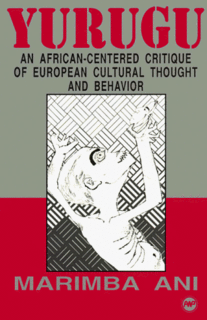YURUGU : an african-centered critique of European cultural thought and behavior

Dr. Marimba Ani aka Dona Richards
Le travail de désaliénation épistémologique des Nègres engagé par l’école afrocentrique a enregistré une œuvre majeure produite par Marimba Ani, en 1994, au terme de vingt longues années de recherches persévérantes, et combien érudites. Quinze ans après sa publication, on attend encore la traduction française de ce chef-d’oeuvre, dont il faut déplorer que des millions d’écoliers et étudiants africains enfermés dans le carcan « francophonique » n’en sauront probablement jamais le moindre mot. C’est ainsi une énième occasion de dénoncer cet encasernement linguistique colonialiste qui isole tant d’Africains de la plus importante tradition scientifique négro-africaine moderne en quoi consiste la littérature américanophone des « African-american studies », dont les premières œuvres datent du début du XIXè siècle, voire de la fin du XVIIIè, et dont les plus prestigieuses institutions académiques telle que la Howard University n’ont pas d’équivalent en Afrique dite « francophone ». Toute une vitalité intellectuelle séculaire, de combats, de résistances, une créativité scientifique d’avant-garde, que le piège désuet de la « francophonie » tient fermement à distance du public africain du « Pré-Carré » endoctriné aux œuvres souvent négrophobes de la « Pléiade » et des « Lumières »…

Dans Yurugu, Marimba Ani s’arme de concepts négro-africains fondamentaux pour affronter la tradition intellectuelle européenne/occidentale. L’auteure procède à une analyse serrée de ses œuvres « classiques » pour montrer comment celles-ci surdéterminent les actes les plus cruciaux posés par les Blancs dans leurs rapports aux non-Blancs, notamment en cette funeste conjoncture contemporaine du Yovodah, qui a débuté par la déportation outre-Atlantique de dizaines de millions de Nègres, et l’extermination d’au moins autant de nations autochtones d’Amérique. La cruauté de cette conjoncture historique pluriséculaire a été magistralement décrite par Rosa Amélia Plumelle-Uribe à travers « La férocité blanche » ; ses conséquences les plus actuelles en Afrique ont été pointées par Aminata Dramane Traoré dans « L’Afrique humiliée ». Cette dernière insistant sur notre méconnaissance de soi comme l’une de nos plus graves carences :
« […] l’humiliation du continent africain ne réside pas uniquement dans la violence, à laquelle l’Occident nous a habitués. Elle réside également dans notre refus de comprendre ce qui nous arrive. »
L’ouvrage de Marimba Ani marque au contraire le refus de ce « refus de comprendre », à l’instar de ce qu’a fait Ama Mazama dans « L’impératif afrocentrique » : certes, il y a « l’impératif » catégorique à se comprendre soi-même ; mais à partir de cette connaissance intime de soi, il y a également une exigence vitale à comprendre radicalement l’autre, celui dont les modalités criminelles de la rencontre nous ont été si fatales. Aussi est-ce cette dernière exigence qui fait l’objet du travail de Marimba Ani.
Pour mieux planter le décor, on en propose ci-après un extrait de la magistrale préface par John Henrik Clarke :
In this book, Professor Dona Richards [aka Marimba Ani] has opened up a Pandora’s box called racism that will not be easily closed by the creators of racism or its victims. What she is saying will have to be seriously considered if the reader of her words is ever to know peace. This is a pioneering and ground-breaking work dealing with a neglected aspect of European culture. Most books about Europeans deal mainly with what Europeans think of other people. In this book Professor Richards has analyzed the European influence on the world based on what they think of themselves and how this thought affects most of the world.
Without saying it, she has emphasized that for the last 500 years the world has been controlled by a form of European nationalism. They have created a concept called the “cultural other” that has influence their vision of themselves and other people in their contact with Africans, Asians, and people of the Pacific Islands. They have declared most things primitive that they could not understand. They have laughed at the gods of other people. This cruelty was compounded when, through propaganda and the misuse of the Bible, they taught other people to laugh at their chosen gods and adopt the god of their conqueror.
I have referred to this as the manifestation of the evil genius of Europe. They were the last branch of the human family to emerge into that era called civilization. In their conquest of the minds of most of mankind they have been able to convince themselves and others that they were indispensable to civilization, and without them it would not have existed.
What the European has forgotten and made his victims forget is that over half of human history was over before most of the people of Africa and Asia knew that European was in the world. The emergence of Europeans or white people as the handlers of world power and their ability to convince millions of people that this is the way things should be is the greatest single propaganda miracle in history.
In the 15th and 16th century Europeans not only colonized most of the world, they colonized information about the world. They developed monopoly control over concepts and images. The hallmark of their colonization in this regard was the colonization of the image of god. After number of years under European domination, the slaves and the colonial subjects of the Europeans would not dare to mention the word god in a language of their own creation or visualize god through the lens of their culture.
[…] The above statement indicates the arrogance of the Europeans in the expansion beyond their shores on the lands of other people. Since the re-emergence of Europe in the 14th and 15th century to the present day, part of what I refer to as their evil genius is their ability to drain the diseased pus of their political sores on the lands of other peoples. With consistency they have attempted to solve their problems at other people’s expense. The European has a grab bag of rationales for seizing the land and resources of other people in order to justify their domination.
